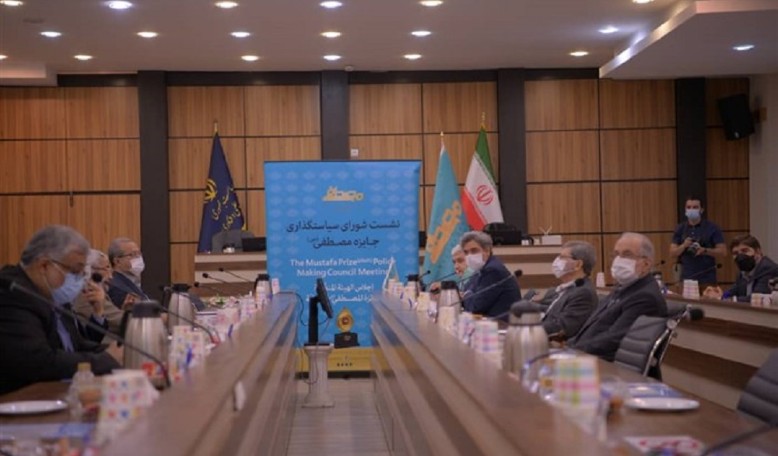Mustafa(Pbuh) Prize: Opportunity for Islamic countries to benefit from world’s scientific potentials
The 11th meeting of the Mustafa(Pbuh) Prize Policy-Making Council was held in the office of Vice Presidency for Science and Technology.
MSTF Media reports:
The 11th meeting of the Mustafa
Prize Policy-Making Council was held on the subject of selecting the laureates of the 4th round of Mustafa
Prize.
The meeting was held with the presence of Sorena Sattari, head of the Mustafa
Prize Policy-Making Council; Muhammad Iqbal Choudhary, Coordinator General at COMSTECH; Mahdi Saffarinia, Secretary of the Mustafa
Prize Policy-Making Council and other individual and legal members.
At the beginning of this meeting, Mahdi Saffarinia presented a report of the performance of the Mustafa
Prize’s secretariat over the past two years.
He said networking, capacity-building, discourse-making, and accreditation are the pivots around which the Mustafa
Science and Technology Foundation’s (MSTF) mission revolves.
In the evaluation process, 1200 individuals from 32 countries were assessed. The scientific communication has been kept with more than 400 of them, he said.
Noor School Student Competition is one of the programs developed by the MSTF. Four rounds of this competition have been held so far, in which more than 15000 individuals from 7 countries participated. In the upcoming days, the call for the 5th round of Noor School Student Competition will be announced.
Another program developed by the MSTF is KANS (Knowledge Application and Notion for Society), only one round of which has been held so far.
STEP (Science and Technology Exchange Program) is the other program developed by the MSTF. Seven rounds of STEP have been held so far, in which 400 individuals participated. Now, more than 100 of those eminent scientific figures communicate with each other, and 910 scientific centers collaborate with the Mustafa
Prize.
Over the past two years, the 6th STEP in the field of Water, Energy, and Health was held with the presence of 68 individuals from 28 countries, he said. Moreover, the 7th STEP was held virtually on the theme of Coronavirus challenges with the attendance of 37 scientists from 18 countries.
Secretary of the Mustafa
Prize Policy-Making Council also talked about the 4th EISA (Exposure of Industries to Scientists’ Achievements) summit in which 24 technologists from 16 countries participated and during which more than 80 B2B meetings were held. The 5th EISA summit was held in December with 44 technologists from 16 countries.
Saffarinia pointed to 5 rounds of Science Promotion Meetings as well, which are aimed at reflecting the scientific achievements.
Secretary of the Mustafa
Prize Policy-Making Council stated that the government does not finance the Mustafa
Prize. The Prize is financed through the endowments that more than 500 individuals have made to The Mustafa
Prize Investment and Endowment Fund, he highlighted. So far, an overall amount of 3 million dollars of the Prize has been payed, Saffarinia announced.
The Mustafa
Prize has had a good international media coverage so far; well-known credible media like The New York Times and The Guardian have covered its news. Overall, the MSTF communicates with 160 credible media in 23 countries, he said.
Gholam Hossein Halvaei, deputy of Science, Technology and Innovation at the MSTF noted that the evaluation of the nominated works in the 4th round of the Mustafa
Prize is the result of 20,000 man-hours.
“We have tried our best to do this process in accordance with international standards,” he said. The call for the 4th round of the Mustafa
Prize was announced in November 2019 and sent to 4000 individuals around the world.
The Mustafa
Prize is concentrated on the achievements made in science; the achievements should be “impressive in the Islamic world as well,” he emphasized, adding that the individual who has made the achievement should be a renowned scientist.
“The scientific committee of the Mustafa
Prize has been chosen from different countries to do the evaluation process with utmost accuracy,” Halvaei added.
At the end of this meeting, Sorena Sattari, head of the Mustafa
Prize Policy-Making Council said “This prize shows the Islamic world’s scientific potential to the world.”
“The Mustafa
Prize is an opportunity for Islamic countries to benefit from the world’s scientific potentials,” he added.
“More Islamic countries should participate in this prize, especially those who have high scientific capabilities and are not known yet,” he continued, adding that “This increases international networking among Islamic countries.”
The 4th round of the Mustafa
Prize will be held in October this year concurrently with the Islamic Unity week.

